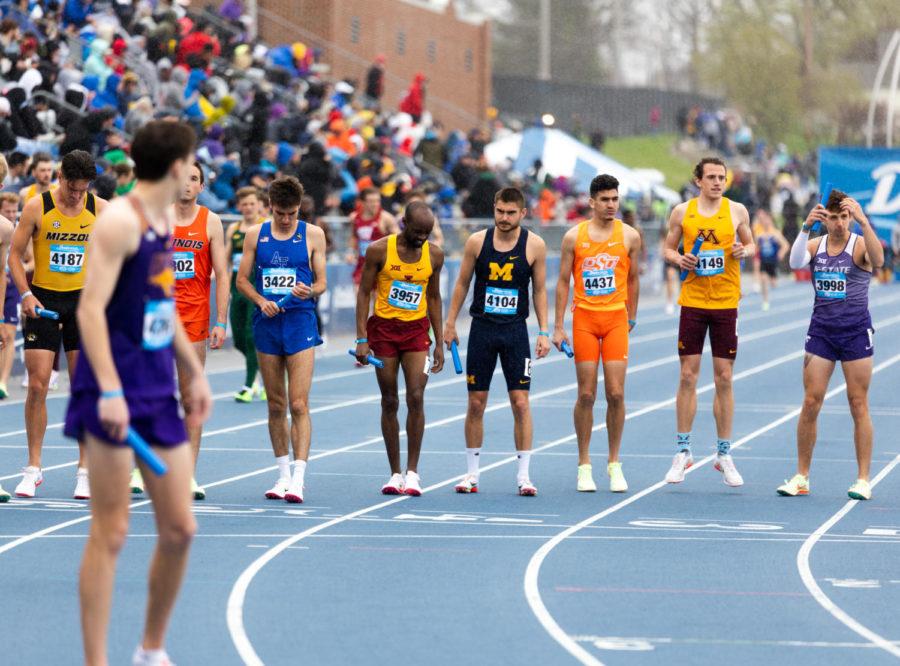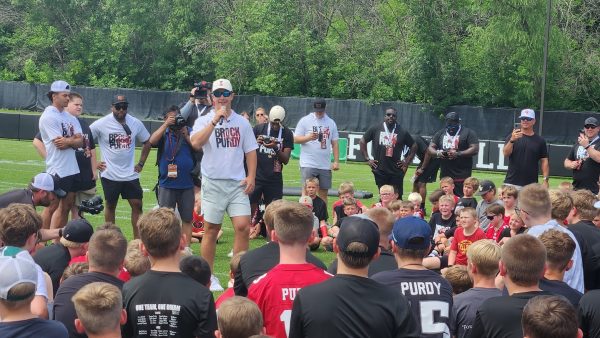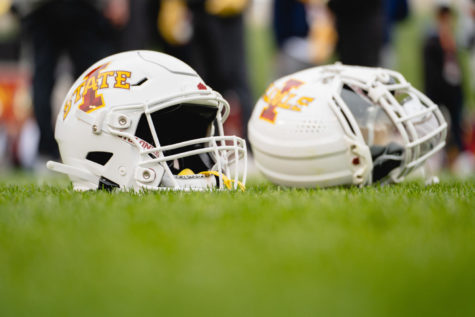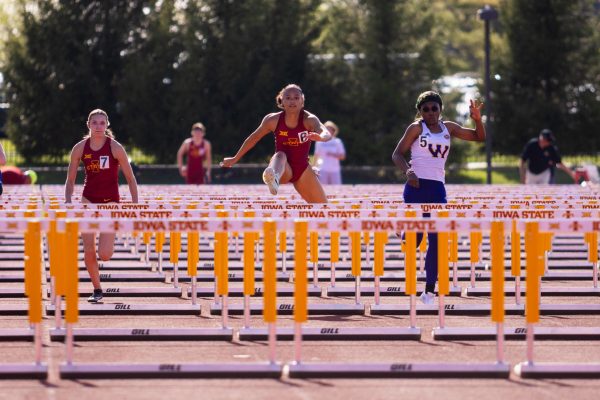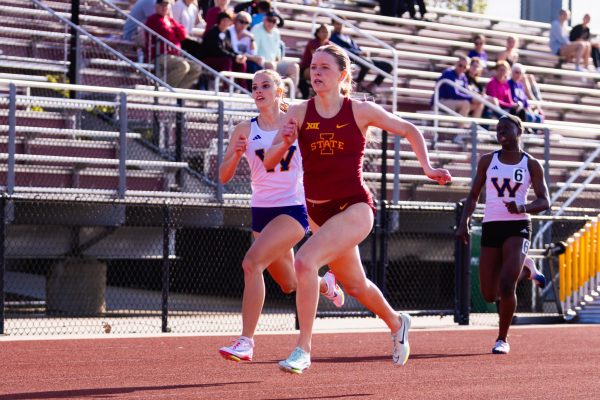Six Cyclones qualify for NCAA Outdoor Championships
Senior distance runner Nehemia Too (center) stands on the start line before a relay race at the 2022 Drake Relays in Des Moines, Iowa. Too helped Iowa State to a first-place finish in the men’s 4x1600m relay and eighth in the distance medley relay.
May 29, 2022
Iowa State finished the NCAA Track & Field West Regional on a high note over the weekend, as Cyclone athletes from four different events successfully made their bids to move onto the national championships. Outside of the six athletes to move on, there were also a handful of strong performances and personal bests set at the final meet of the year.
Redemption, fast times and cut-throat competition were major themes of the weekend’s action in Fayetteville, Arkansas, as Cyclone athletes battled it out with some of the nation’s best to see who would move on to the national championships.
In the end, the level of competition across the board resulted in a high bar for all athletes, as the Cyclones came away from the meet, having set a total of seven personal bests and a school record.
Too breaks 1500-meter school record
Senior distance runner Nehemia Too was Iowa State’s first athlete to qualify for the national finals Friday by qualifying on time in the men’s 1500-meter quarterfinals. Too’s mark of 3:39.15 made him the new school record-holder, as he broke Steve Green’s 28-year-old record performance. Green’s top time of 3:39.19 was run at the 1994 Commonwealth Games.
Too staked his claim on first place early in his race, running in the first heat of the day amongst a field that included All-Americans and conference champions on both the track and cross country course. Luke Houser of Washington and George Kusche, the Nebraska to Northern Arizona transfer, led the field after the first 300 meters, both recording split times under 44 seconds.
With the top five finishers in each of the two heats getting automatic advancement into the NCAA finals, Too had his hands full trying to get into the upper echelon of the field with Oregon’s Elliott Cook and Colorado State’s Jacob Brueckman. Both Cook and Brueckman earned individual conference titles in their respective championships, with Brueckman earning gold in the 1500 meters at the Mountain West Championships earlier this month.
Into the bell lap, Too still trailed both Brueckman and Elliott and also had Oklahoma State’s Ryan Schoppe hot on his heels. Over the final stretch of the race, Too tried to make a move and get past Brueckman, but the CSU senior was able to hold him off as the pair finished fifth and sixth, respectively.
Too’s place in the national finals was now based on the finishing times of the second heat. Fortunately for him, that race was run at a slower pace, with Illinois’ Jonathan Davis winning the race with a time of 3:42.69. This ensured both Too and Schoppe the two time-qualifying spots and entry into the top 12. Along with Too, Cook and Brueckman established personal bests with finishing times of 3:38.92 and 3:39.04, respectively.
With his performance, Too became the first Iowa State athlete to run in the 1500 meters at the national championships since Brandon Rooney did so in 2010. It will be his third trip to an NCAA track and field championship meet, as he earned All-American honors as part of Iowa State’s distance medley relay team at the indoor finals in 2021 and 2022.
Ford earns NCAA ticket with 5K PR
Ryan Ford made the most of his second chance at the championships, as he ensured an extension to his collegiate career by producing the best performance of his career in the 5000 meters.
Ford and fellow senior Thomas Pollard were Iowa State’s hopefuls in the 10000-meter run Thursday, but neither of them was able to get into the top-12 of their heat. Pollard was close to getting a qualifying spot but was involved in a four-person accident with 1300 meters left in the race. The Ames native saw his chance of earning a spot in the NCAA finals fade as a result, as he finished 15th in a time of 29:04.74.
Ford fared worse, as he did not finish the race after dropping out with less than 1500 meters to go. In another hotly contested race Friday evening, Ford found himself having to keep pace with a field that was averaging just over a minute split time for each lap.
With half of the race gone, he sat in the top seven and primed to break his personal best. Like Too in the 1500 meters, the top five runners in each heat plus the next two fastest qualifiers on time made up the 12 that moved onto Eugene.
Ford practiced a patient race strategy as he spent most of the laps in the middle of the pack. With just over half a mile left, he made his move and shifted into the top-seven, as his next target was to now catch up to Aaron Bienenfeld of Oregon and Tulsa’s Micheal Power.
The pair slowly broke away from Ford, who had to settle for seventh in a new personal best time of 13:34.79. That time was eight seconds better than his previous top time, as Ford now holds the sixth-fastest time in Cyclone history.
Like Too, Ford had to wait and watch the other semifinal race to see if he would qualify on time. Also, like Too, his race’s fast pace set a high bar for the other athletes, and Ford and Bienenfeld joined the top ten finishers from both heats to move on.
It was a long-awaited moment for Ford, nicknamed “Chevy Dodge” by Cyclones head coach Jeremy Sudbury. A graduate transfer from Tennessee-Martin before the start of the year, he also helped the Cyclones take home second place at the NCAA Cross Country Championships in the fall.
Newcomers club
Including Too and Ford, four of the Cyclones’ six entries will be making their debut appearance at the outdoor national championships.
The duo of Jason Gomez and Cebastian Gentil will represent the Cyclones in the men’s 800-meter run. Gomez ran a then-outdoor personal best at last year’s NCAA Championships, finishing 11th with a mark of 1:47.82.
He earned safe passage through to the next round by grabbing an automatic qualifying spot in his heat, making a move on the outside on the bell lap to finish third. Gomez overtook Luis Peralta of Oregon to earn his second-consecutive trip to Hayward Field.
Gentil was Iowa State’s next newcomer, as he earned his debut appearance in the national finals in dramatic fashion. On the final bend, he sat on the outside-looking-in at sixth place and out of contention for a shot at a spot in the top 12.
That’s when he shifted to another gear, as he passed one runner after another over the final 100 meters and eventually won in a time of 1:47.62. It will also be Gentil’s second appearance at a national-level meet, as he was a member of Iowa State’s distance medley squad that finished ninth at last year’s indoor championships.
Emily March can now add NCAA Championship qualifier to her growing collegiate resume, as she punched her ticket into the NCAA finals for the first time in the women’s discus.
March, who holds the school record with a throw of 58.27 meters, gradually got into form through her series of throws. Her first mark of 50.38 meters was improved to 55.24 in round two to move up into the 10th place position in her flight.
Qualification was assured in the final round for March, as she threw 55.76 meters on her third attempt to hold her spot within the top-12. The Livermore, California native will return to the West Coast, with the field at the NCAA meet having some familiar competition.
Arizona State’s Jorinde Van Klinken and Kansas’ Alexandra Emilianov finished 1-2 at the regional championships and will be two of the favorites to take the title in Eugene. Van Klinken enters as the defending national champion in the discus, having won the title last year at 65.01 meters.
Iowa State’s roster is rounded out by Kevin Sakson, who will represent the Cyclones in the men’s discus. Sakson got into the national finals on another personal-best performance, producing a throw of 57.26 meters to earn his first appearance at the national meet.
Three personal bests were set in the discus competition in Lubbock, with California’s Mykolas Alekna establishing a new facility record at 64.87 meters. Wyoming’s Nathan Reid also earned a new PR by throwing for 55.59 meters to finish 10th overall.
Sakson’s day started strong, as he established a new season-best mark in round one by throwing the discus 55.20 meters to place him atop the leaderboard. It was Sakson’s first legal throw at an NCAA outdoor regional, as he fouled out of both the discus and shot put last year in College Station, Texas.
After scratching on his second throw, Sakson produced the best throw of his career and erased the disappointment from one year ago. He broke his previous top mark by more than half a meter and stood atop the field as the best of the first flight of athletes.
Sakson fell to fifth after the second series of throwers but was guaranteed a ticket to the NCAA finals by finishing in the top-12. He became the first Iowa State athlete to qualify in the men’s discus since Jamal Cann in 2005. His throw also moved him up two spots on the program’s all-time leaderboard to No. 7.
The NCAA Outdoor Track & Field Championships will kick off June 8 at Hayward Field in Eugene, Oregon. All events will be broadcasted live on the ESPN family of networks.

